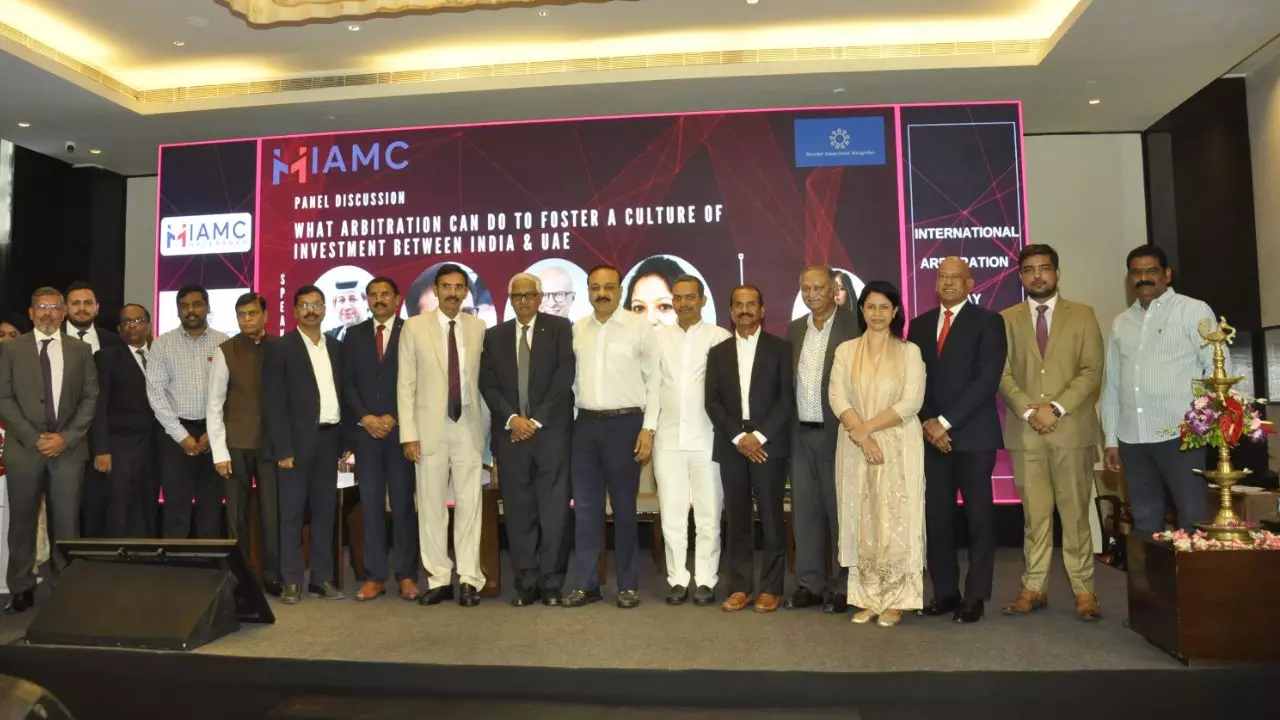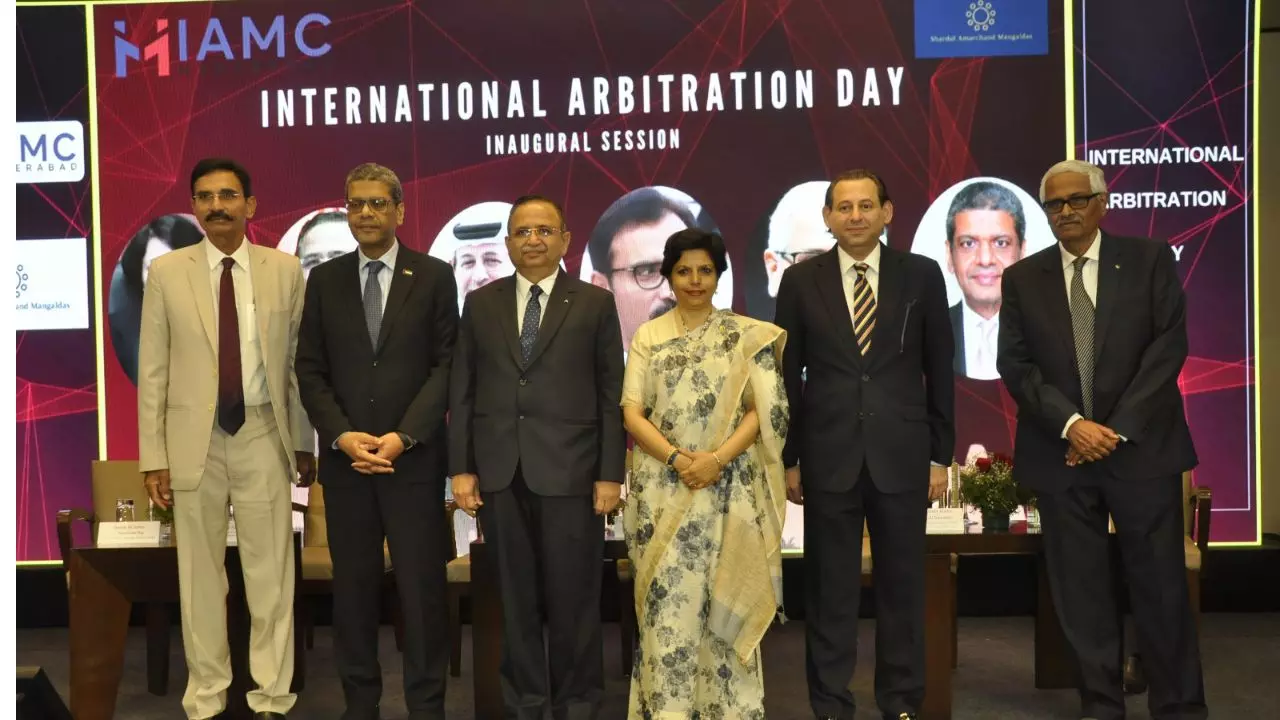CREDAI, RERA, NAREDCO, AIAC And Other Leading Organizations And Law Firms Extend Support To IAMC Hyderabad
LIVELAW NEWS NETWORK
9 Oct 2023 2:44 PM IST
The International Arbitration & Mediation Centre (IAMC) Hyderabad in collaboration with Shardul Amarchand Mangaldas & Co. organized its first flagship event – International Arbitration Day on October 07, 2023.
The event witnessed dignitaries from across the globe, including Supreme Court Judges and High Court Judges, Senior Advocates, International Judges, senior members International arbitral Institutions, Partner from foreign and Indian Law firm Partners, industry bodies like, CREDAI, RERA, TDA, TiE, NAREDCO, in-house counsels and other stakeholders.
Significantly, IAMC Hyderabad signed an MoU with the Asian International Arbitration Centre (AIAC), Malaysia and Telangana State RERA signifying strategic alliance in the field of dispute resolution.
IAMC Hyderabad also signed letters of support with Telangana Chapters of organisations like CREDAI, NAREDCO, TDA, TiE, Tatva Legal and Fox Mandal & Associates, Hyderabad outlining mutual cooperation, sharing of resources, and collaborative efforts to promote effective and impartial arbitration services.
The flagship event began with the inaugural session where Justice Hima Kohli, Judge, Supreme Court of India delivered the keynote address while Justice Alok Aradhe, Chief Justice, High Court for the State of Telangana delivered an address highlighting the need to foster the growth of arbitration in India.
The inaugural session was also graced by His Excellency Justice Shamlan Al Sawalehi, Court of Appeal and Judge in Charge of Arbitration Division, DIFC Courts, UAE, His Excellency Areef Alnuaimi, Consulate General of UAE at Hyderabad, and our life trustees Justice L. Nageswara Rao, Former Judge, Supreme Court of India, and Justice RV Raveendran, Former Judge, Supreme Court of India.
Panel Discussion: What Arbitration Can Do to Foster A Culture of Investment Between India & UAE
His Excellency Justice Shamlan Al Sawalehi remarked that majority of businesses in the middle east prefer arbitration due to party autonomy, neutrality and confidentially involved in the arbitral process rather than going to a local court. He further emphasized, “You need to pick up a neutral seat which is familiar with common law because you need the court to support you.” The 7 Emirates have their own arbitration centres as well as arbitration centres dedicated specifically to Islamic finance. In terms of facilities, legislation, and court’s support, UAE is arbitration friendly. It is important to see how supportive the country is towards arbitration when choosing the seat of arbitration. “Regarding the enforcement of arbitral awards in India that are passed in the UAE, we have escalated the matter to the Ministry of Justice in UAE to deliberate with the Ministry of Justice in India to make the process of enforcing foreign arbitral awards easier in India that are passed in UAE seated arbitrations as taking the indirect route of enforcing UAE based arbitral awards as foreign decrees in UAE and then Indian courts involves additional costs and delay.” One way of mitigating this issue of enforcement can also be if there are designated courts for dealing with arbitration matters. Now in UAE, there is minimal interference by courts in enforcement of arbitral awards.
Justice L. Nageswara Rao highlighted when an international contract is entered into, the dispute resolution clause, the seat of arbitration, the credibility of the panel of arbitrators from a credible institution, and the procedural law of the seat of arbitration are all very crucial factors that need to be considered. It is not necessary that only judges should be arbitrators, rather legal professionals, advocates can be also appointed as arbitrators. As far as IAMC is concerned, when the panel of arbitrators will be prepared, it will have a mix of arbitrators, and not only judges but legal professionals as well as other experts from various industries will be considered and the parties will have the autonomy to choose from the prepared panel. “Neutrality in arbitration is very important.” The first roadblock when an award is passed in an arbitration seated in UAE is enforceability, there has been no notification issued u/s 44B of the Arbitration & Conciliation Act of 1996 by the Government of India. However, the only notification issued u/s Section 44 of Civil Procedure Code, 1908, refers to foreign decrees passed by federal courts and superior courts in UAE which can be enforced in India in terms of foreign awards. Another roadblock was public policy which has now been explained to include only fundamental public policies which can pose as grounds of rejection of enforcing foreign awards in India. Delay also appears to be a major problem. In near future, enforcement might not be a problem since the number of commercial courts will soon be increased.
Mr. Thomas Snider, Partner, and Head of International Arbitration Charles Russell Speechlys, remarked that the trade bond between India and UAE is very strong and there exists a strong investment relationship between India and UAE. “If I were an Indian party thinking about having an arbitration seat outside India, I would look at DIFC or ADGM. You can also have IAMC as the venue of arbitration if the arbitration is seated in Dubai.”
Ms. Shruti Khanijow, Partner, Shardul Amarchand Mangaldas & Co. stated that it is important for investors to understand the judicial and commercial arbitration system in place in India and UAE. Parties prefer seats of arbitration where there are certainty, efficacy and lower costs in the arbitral process and the speed of granting interim measures is quicker.
Ms. Parnika Chaturvedi, Partner, Kings Wood & Malleson, Dubai, UAE, moderated the session.
Fireside Chat Session: Between Dispute Avoidance and Dispute Resolution: The Asian Approach
Justice RV Raveendran stated that care should be taken while drafting the agreement. Dispute avoidance is a preventative step while dispute resolution is a curative step. If dispute avoidance clauses are put in place, then a lot of disputes could be avoided. Today, lawyer, does not refer to litigation, rather in law firms or big industries, a lawyer comes into play since the beginning of businesses; They act as transaction lawyers or in-house counsels and these lawyers can help in preventing disputes and litigation. Indian mentality has merit, ability and capacity but lacks professionalism, added to all other abilities we have, India will be capable of resolving their own disputes and the professionalism will ensure that arbitrations are completed on time. Let us change the culture and bring in professionalism. “Integrity is not a quality; it is the fundamental requirement. Let us make this as the culture of IAMC. Government is not against mediation but the problem is not the government, the problem are the government servants because they are not willing to mediate. He suggested that the mindset of the government servants have to be changed and a system has to be introduced where a group of officers can sit as a panel and give reasons why that matter is getting settled. Government is the biggest economic litigant in India and mediation will have to come to its rescue.”
Datuk Professor Sundra Rajoo, Director, Asian International Arbitration Centre, Malaysia commented that disputes arise because of differences in interpretation or in addressing the problems. The solution is crafting better contracts including ESG compliances, anticipating difficulties, and performing particular aspects of obligations. He further commented that determining Lex Arbitri, and the governing law may be the law of the country, or institutional rules if it is an institutional arbitration or if the arbitration is an ad-hoc one, then one must look at what rules industry has in place or follows.
Ms. Jennifer Lim, International Arbitration and Dispute Resolution Lawyer, Partner at Sidley Austin LLP, Singapore remarked that in terms of saving time and costs, preserving relationships, the combination of arbitration and mediation, that is, arb-med-arb, works excellently. She further suggested industry leaders to involve lawyers early in the business or rather even before commencement of new ventures.
Mr. Bikram Chaudhuri, Partner, Shardul Amarchand Mangaldas & Co commented, “The focus should be on mediation and on training in mediation and IAMC is going in the right way with this.”
Mr. Abhinav Bhushan, Chief Executive for Asia & International Arbitrator, Member at 39 Essex Chambers, moderated the fireside chat session and commented that “IAMC has both Mediation and Arbitration Rules in place which complement each other at a world class level.”
Justice L. Nageswara Rao added further remarks to the fireside chat session and talked about deal mediation as an effective tool of dispute avoidance. It refers to involving mediators at the stage of entering into agreements who will tell the parties about possible problems and at what stage they could arise therefore industry leaders should consider engaging a deal mediator for avoiding disputes.
The flagship event of IAMC Hyderabad concluded with a vote of thanks by Mr. Tariq Khan, Registrar, IAMC Hyderabad.




